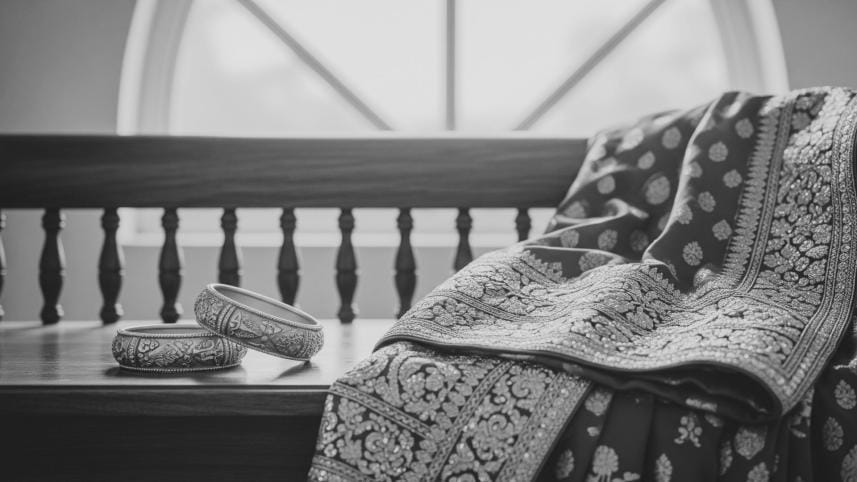How dare you carry our saree and churi as an insult?

Many of us foam at the mouth when a rape or any incident of violence occurs against women. We say, "What if it happened to our mother, daughter or sister?"
This already indicates that women are not seen as proper individuals, just as a connection to men.
But even after that, when law enforcers fail to do their jobs, we reach for the saree and churi (bangles), things worn by women, to insult them.
It happened after the 2013 Pahela Baishakh mass molestation and many times after that. It happens when the state fails to act fast enough.
And what is the message sent, again and again? "You are not real men. You are like women."
Apparently, in the imagination of some Bangladeshis, the worst insult you can hurl at a man is to compare him to a woman. And that's how rotten this version of shame is—sheer misogyny dressed as outrage.
Let's get one thing straight. If your idea of resisting state failure is to equate "femininity" with cowardice, you are not challenging injustice. You are reinforcing it.
If you think handing over bangles to a police officer is a "mic drop" moment, you're only dragging every girl and every woman down with your lazy and very offensive metaphor.
Because in this symbolism, the bangles don't stand for strength—you make them stand for weakness. The saree is no longer heritage after you make it a form of humiliation.
And while you try to say "you failed", what you and the public in general end up saying is, "You became a woman."
Why is womanhood your insult? Why is femininity your punchline? Why is your protest built on the bones of another kind of oppression?
The irony is as sickening as it is consistent.
How dare you?
These are the same streets where women are groped, slapped, harassed, and silenced. The same institutions that turn a blind eye to the crimes we face are now being shamed by being called us—as if being a woman is somehow not good enough. We become the scapegoat metaphor for state dysfunction. As if all we are is a symbol of failure, as if our very being is something to be ashamed of.
Let us not forget that it was women who stood at the forefront of many of this country's battles—in our revolutions, our resistance movements, and our cultural awakening. Women were spies, freedom fighters, organisers, protesters, poets, and protectors.
Pritilata Waddedar didn't hand over bangles. She wore a saree and raided a British club. Noorjahan Begum didn't throw churi. She picked up a pen when no other woman was allowed to. Begum Rokeya wore a saree while pioneering the feminist movement in Bengal. Ferdousi Priyabhashini bore torture and reclaimed her voice—she too wore saree and churi. Thousands of women during 1971 were raped, shamed, and discarded, yet still lived to tell their stories, raise their children, and survive a nation that refused to look them in the eye.
We've always been on the front lines—wearing sarees and churis.
And so, how dare you show our garb as a sign of weakness? How dare anyone use the symbols of our daily strength as props for your protest?
How dare you?
What is perhaps even more disturbing is the mainstreaming of this sexist rhetoric. No political party is exempt, and no generation is innocent. From meme culture to martyr monuments, we have taken gendered slurs and turned them into performance art.
It is a sick joke.
Because while you were busy insulting the police with these "feminine objects", survivors were waiting at the station for someone to take their case seriously. While you tossed bangles at parliament, children were being abused in homes and madrasas and on the streets, with no state response. You had time for gendered theatre, but not for gendered violence.
And of course, the police should be held accountable whenever necessary; they should be publicly criticised when they fail to protect. But don't call them women for failing. Call them out for being corrupt, complicit, undertrained, over-armed, and unwilling. Call them cowards if you must, but do not wrap cowardice in a saree and pretend to be a "protester". What you are doing is undermining all women. If that is your goal, just say it.
But real protest is specific; it is principled; it points its finger at the perpetrator, not at womanhood.
The next time your blood boils with rage, let it. But keep your sexism out of it. Don't borrow your mother's bangles or your sister's saree to make a statement that insults more people than you want to.
Remember, if you can't protest without insulting half the population, maybe you are not protesting—maybe you are just revealing your own prejudice.
And if that's the case, perhaps it is you who should be ashamed.
Because otherwise, how dare you?
Naziba Basher is a journalist at The Daily Star.
Views expressed in this article are the author's own.
Follow The Daily Star Opinion on Facebook for the latest opinions, commentaries and analyses by experts and professionals. To contribute your article or letter to The Daily Star Opinion, see our guidelines for submission.




 For all latest news, follow The Daily Star's Google News channel.
For all latest news, follow The Daily Star's Google News channel.
Comments